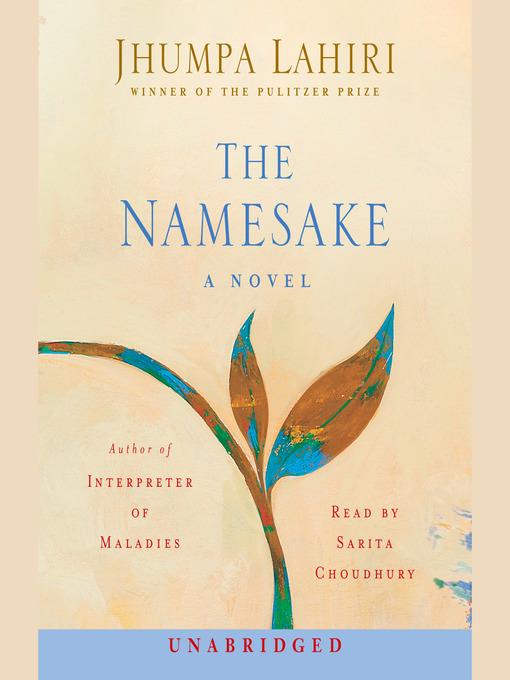
The Namesake
فرمت کتاب
audiobook
تاریخ انتشار
2003
Lexile Score
1140
Reading Level
8-9
نویسنده
Sarita Choudhuryشابک
9780739306963
کتاب های مرتبط
- اطلاعات
- نقد و بررسی
- دیدگاه کاربران
نقد و بررسی

Jhumpa Lahiri, author of a Pulitzer Prize-wining short story collection, offers as her first novel the multigenerational story of the Ganguli family, who arrive in Cambridge, Massachusetts, from Calcutta in the 1960s. Over 40 years, we follow the arranged marriage of Western-oriented Ashoke and his traditional wife, Ashima, and the efforts of their children to live both American and Indian lives. It's an involving novel, replete with Lahiri's trademark social observations and fine-tuned jewel-like phrasing. Sarita Choudhury has a pleasant voice, and manages an American-accented narration and Bengali accents very well. One comment on the production quality, however--sudden changes in the narrator's tone and the sound level indicate that many words and phrases were rerecorded and dubbed into the original. It's a bit off-putting in an otherwise excellent audiobook. A.C.S. 2004 Audie Award Finalist (c) AudioFile 2004, Portland, Maine

July 7, 2003
One of the most anticipated books of the year, Lahiri's first novel (after 1999's Pulitzer Prize–winning Interpreter of Maladies) amounts to less than the sum of its parts. Hopscotching across 25 years, it begins when newlyweds Ashoke and Ashima Ganguli emigrate to Cambridge, Mass., in 1968, where Ashima immediately gives birth to a son, Gogol—a pet name that becomes permanent when his formal name, traditionally bestowed by the maternal grandmother, is posted in a letter from India, but lost in transit. Ashoke becomes a professor of engineering, but Ashima has a harder time assimilating, unwilling to give up her ties to India. A leap ahead to the '80s finds the teenage Gogol ashamed of his Indian heritage and his unusual name, which he sheds as he moves on to college at Yale and graduate school at Columbia, legally changing it to Nikhil. In one of the most telling chapters, Gogol moves into the home of a family of wealthy Manhattan WASPs and is initiated into a lifestyle idealized in Ralph Lauren ads. Here, Lahiri demonstrates her considerable powers of perception and her ability to convey the discomfort of feeling "other" in a world many would aspire to inhabit. After the death of Gogol's father interrupts this interlude, Lahiri again jumps ahead a year, quickly moving Gogol into marriage, divorce and a role as a dutiful if a bit guilt-stricken son. This small summary demonstrates what is most flawed about the novel: jarring pacing that leaves too many emotional voids between chapters. Lahiri offers a number of beautiful and moving tableaus, but these fail to coalesce into something more than a modest family saga. By any other writer, this would be hailed as a promising debut, but it fails to clear the exceedingly high bar set by her previous work. Agent, Eric Simonoff. (Sept. 16)Forecast:Lahiri's previous collection is beloved by booksellers and readers alike, and despite the likely lukewarm reviews, orders and sales are sure to soar for this one.Lahiri, who appeared awkward working the crowd at BEA, may take some time to warm up to audiences on the road. Foreign rights sold in 12 countries.

January 5, 2004
This recording features a spare, elegant reading by Choudhury of a story about identity, cultural assimilation and the burden of the past. Ashoke and Ashima Ganguli move from Calcutta to Cambridge, Mass., where they have a son who ends up being tagged with the strange name of Gogol. How he gets the name serves as an important theme as he deals with it and his heritage. The fact that Choudhury herself is half Indian aids her narration, as characters with that country's accent abound here. But much more important to this project is her lovely, mellifluous voice and even tone, which complements the text's own lush imagery. Perhaps owing to her English pronunciation, she is also adept at putting a polished spin on the voices of the upper-crust Manhattanites with whom Gogol becomes intertwined for a while. With such an excellent narrator, the recording neither needs nor includes much in the way of musical embellishment. The book itself makes several jumps in time and occasionally seems disjointed, but this production is a treat for the sheer combination of Lahiri's striking, often enchanting descriptions and Choudhury's graceful rendering of them. Simultaneous release with the Houghton Mifflin hardcover (Forecasts, July 7).

























دیدگاه کاربران